by Lisa Cooke | Jul 26, 2015 | 01 What's New, Craft & Displays, images, Listeners & Readers
 What old family artifacts do you have that would make a great piece of jewelry?
What old family artifacts do you have that would make a great piece of jewelry?
Recently I heard again from Gems follower Jen McGraw, whose question inspired a recent blog post on researching in state capitals. “I make necklaces with vintage postage stamps (from the 1890s thru 1970s) or vintage skeleton keys,” she told me. “I would love to make one for you and give it to you as a gift of thanks for your info and help.” She asked what countries I’m interested in (she has stamps from just about everywhere) and what color metals I wear, then custom-created this gift for me. (She does this for others, too: here’s her Facebook page.)
 A public thanks to Jen–I love this new necklace! What fun to see how she has incorporated these old stamps and keys into new jewelry. Jewelry with found objects is unique and trendy, but I love it because it can be a real conversation-starter. The colorful designs on stamps and their history can say something about the wearer’s family history. To me, old keys symbolize unlocking the fascinating mysteries of the past.
A public thanks to Jen–I love this new necklace! What fun to see how she has incorporated these old stamps and keys into new jewelry. Jewelry with found objects is unique and trendy, but I love it because it can be a real conversation-starter. The colorful designs on stamps and their history can say something about the wearer’s family history. To me, old keys symbolize unlocking the fascinating mysteries of the past.
I have blogged before about incorporating family history into jewelry, like this post about turning a piece of found jewelry (a single earring) into a unique hair accessory. I love hearing about YOUR creative displays and jewelry, too: feel free to send your pictures and stories! Click here to read our blog posts about crafts and displays, or follow my Pinterest board on Family History Craft Projects.
by Lisa Cooke | Dec 12, 2014 | 01 What's New, MyHeritage, RootsMagic, Trees
If you’re a MyHeritage user, you know how powerful their search and record matching technologies are–and how many records and trees they have. If 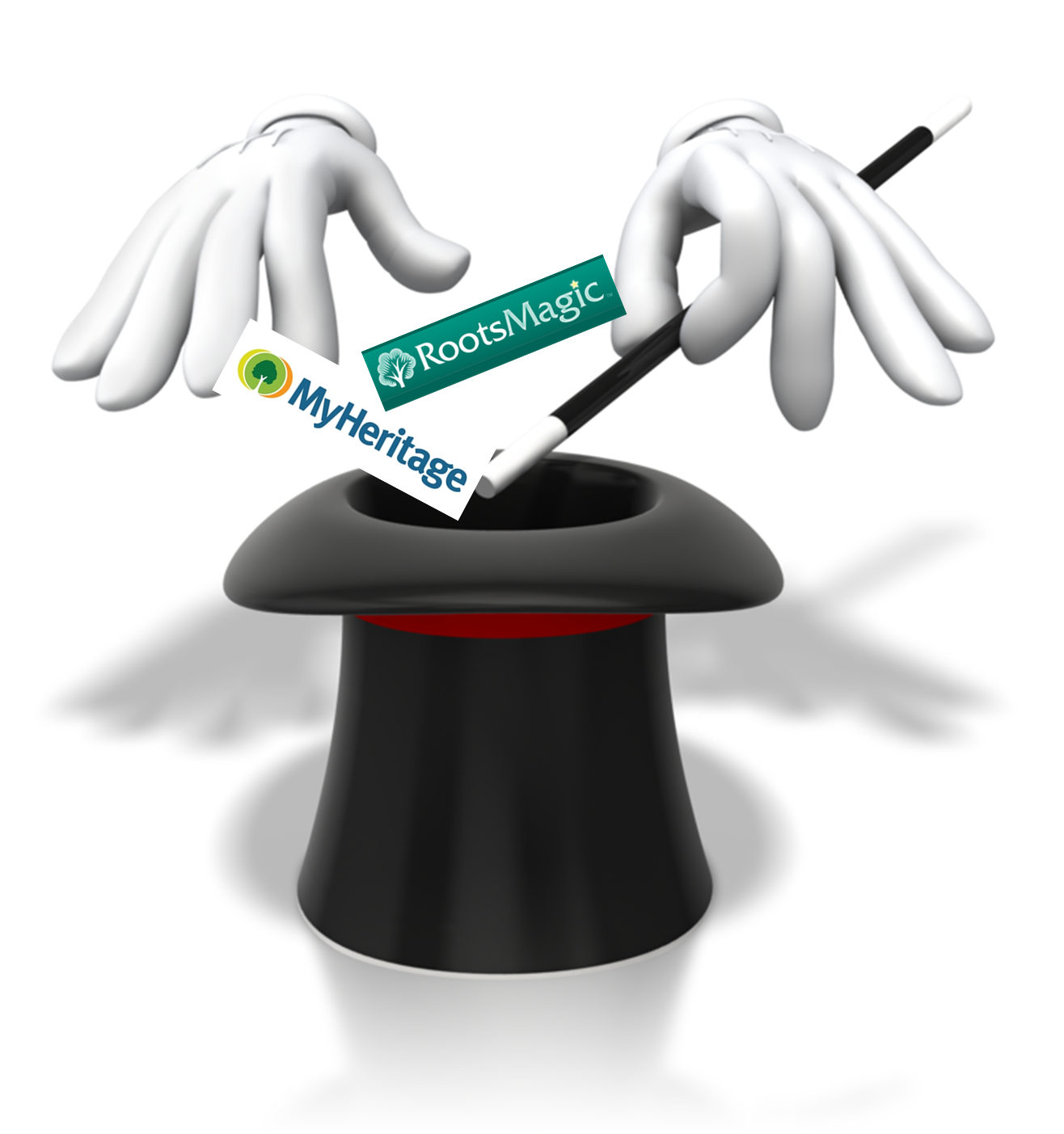 you use RootsMagic, you know how adeptly this family history software helps you build and maintain your master family tree. Now you can work more heritage magic by combining these powerful family history tools!
you use RootsMagic, you know how adeptly this family history software helps you build and maintain your master family tree. Now you can work more heritage magic by combining these powerful family history tools!
MyHeritage’s Smart Matching™ and Record Matching technologies have been integrated into newly-released RootsMagic 7 in a feature called WebHints. Whenever new records become available that match people in your RootsMagic tree, MyHeritage will send you a clickable alert. It’s kind of like having Google Alerts for MyHeritage embedded right within MyHeritage! Some records will be free to view; others will require a MyHeritage subscription. Either way, don’t you want to know what’s out there that you might be missing? (Bonus: WebHints also include hints from FamilySearch.org!)
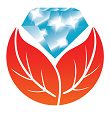 Personally, I’m so pleased to see this collaboration. RootsMagic is a longtime sponsor of the free Genealogy Gems Podcast. MyHeritage also sponsors our podcast now, too. These companies offer products I love to share with readers and listeners because they are truly “genealogy gems.”
Personally, I’m so pleased to see this collaboration. RootsMagic is a longtime sponsor of the free Genealogy Gems Podcast. MyHeritage also sponsors our podcast now, too. These companies offer products I love to share with readers and listeners because they are truly “genealogy gems.”
A few more good-to-know facts:
- RootsMagic assures users that “information sent by RootsMagic to MyHeritage for matching is never collected or shared, and is deleted after matching to ensure the complete privacy of RootsMagic users and their data.
- You do have the option to turn off WebHints if you need to for whatever reason. In the software, go to Tools, File Options, and then uncheck WebHints.
- MyHeritage matching technologies are also being integrated by Dutch genealogy software Aldfaer and the online genealogy services of Coret Genealogie in the Netherlands.
Is it time for you to try a free trial of RootsMagic and MyHeritage? Test drive them both with their freebie versions (still powerful and totally compatible with the paid upgrades). Click here to learn about RootsMagic 7 (and the free version, RootsMagic Essentials) and here to learn about free and paid subscription options at MyHeritage.com.
What are you finding in your WebAlerts on MyHeritage (or by searching the site yourself)? I’d love to hear from you! Post your discoveries on the Genealogy Gems Facebook page!
by Lisa Cooke | Jan 13, 2015 | 01 What's New, Australian, British, Findmypast, Irish, Military, Records & databases
Did your Irish ancestors have a dog? Over 3.5 million Irish Dog Licence registers have been added to a collection already online at
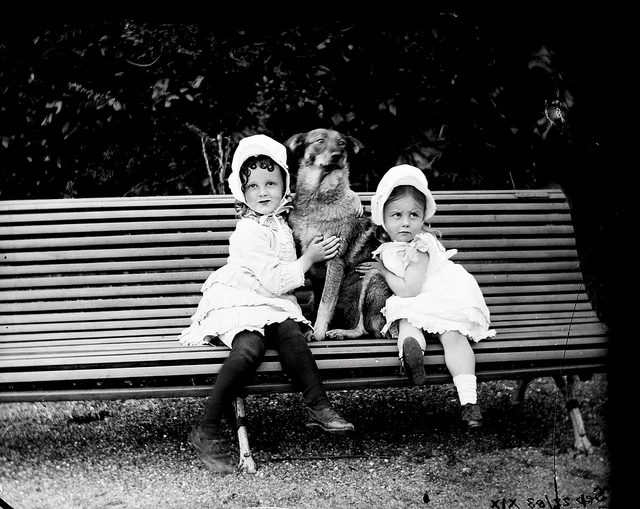
“More Besties from the Clonbrock Estate.” Taken September 22, 1883. National Library of Ireland photograph, posted at Flickr Creative Commons National Library of Ireland on the Commons page. No known copyright restrictions.
FindMyPast. “Now containing over 6 million records, the Irish Dog Licences list not only the name, breed, colour and sex of your ancestor’s four legged friend, but also the owner’s address and the date the licence was issued, making them a valuable census substitute,” says a recent FMP press release.
Also new on the site are other notable collections, as described by FMP:
- Trade Union Membership registers (3.4 million+ records) with digitized images of original records books from 9 different unions. The documents include details about individual members such as payments made, benefits received, names of spouses, and a number of unions published profiles of their members or those who held offices. Many unions kept detailed records for when a member joined, paid their subscription, applied for funeral benefits or superannuation (retirement). These records allow you to follow your ancestor’s progress within the union and perhaps uncover previously unknown details of their working lives and careers. The documents can also include details about the trade unions themselves, such as directories of secretaries, meeting dates and times and items of trade union business. Many trade unions also included international branches from Ireland to Australia to Spain and Belgium.
- Indexes to over 28,000 articles in 2000+ PERSI-indexed periodicals. These include magazines, newsletters and journals, according to location, topic, surname, ethnicity and methodology. (Learn more about PERSI on FindMyPast in our blog post on the topic.)
- Peninsular War, British Army Officers 1808-1814 dataset, compiled by Captain Lionel S. Challis of the Queen’s Westminster Rifles shortly after WW1. Using Army lists, Gazettes, despatches, official records and regimental histories, Challis gathered information on more than 9,600 officers who fought for control of the Iberian Peninsula during the Napoleonic Wars and recorded them on index cards. Each record contains an image of the original handwritten index cards and a transcript.
- South Australia Births 1842-1928. Over 727,000 records and date back to when the compulsory registration of births first began in 1842. Sourced from an index transcribed by volunteers from the South Australian Genealogy and Heraldry Society Inc., each records consists of a transcript that usually includes the child’s full name, gender, date of birth, place of birth and registration number. The names of both parents will also be included and in some cases the mother’s maiden name will also be present. South Australia’s colonial origins are unique in Australia as a freely settled, planned British province.
- South Australia Marriages 1842-1937 contain over 457,000 records. Each record includes a transcript that can contain a variety of information such as the first and last names of the bride and groom, their ages, birth years, marital status, the date and place of their marriage as well as their fathers’ first and last names.
- South Australia Deaths 1842-1972 contain over 605,000 records and span 130 years of the state’s history. Each record consists of a transcript that usually lists the deceased’s full name, gender, status, birth year, date of death, place of death, residence, the name of the informant who notified authorities of their death and their relationship to the informant.
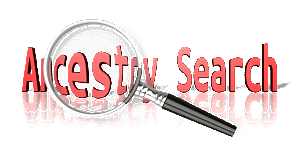 Are you making the most of your online searches at FindMyPast and other genealogy websites? What about on Google? Learn more about search strategies that work in this blog post!
Are you making the most of your online searches at FindMyPast and other genealogy websites? What about on Google? Learn more about search strategies that work in this blog post!
by Diahan Southard | Nov 7, 2014 | 01 What's New, Beginner, Listeners & Readers, Research Skills, Trees
Recently, I heard from Shirley in Austin, Texas (U.S.) with a question about how her relatives are related to each other:
“My GGM (Caroline ‘s) great grandfather (Franz Joseph) is the same as my GGF (Eduard ‘s) grandfather (Franz Joseph). How would they be related to each other? Half 2nd cousin twice removed?
The relative in common (Franz Joseph) and his same wife, had two sons: Franz Carl who is Eduard’s Father, and Johan Anton, who would be Caroline’s Grandfather.”
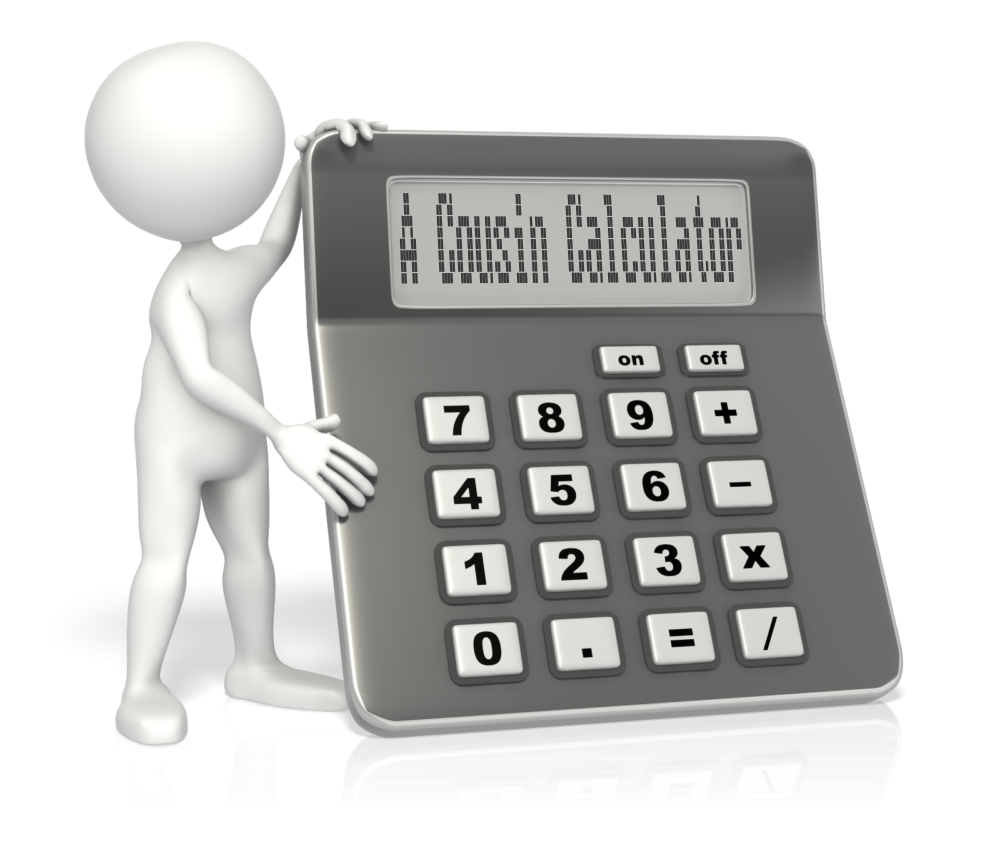
My answer:
I like this Cousin Calculator tool (also called a relationship calculator) at Searchforancestors.com. If Caroline is the Great Grand daughter of Franz Joseph and and Eduard is the Grandchild of Franz Joseph, then according to the Cousin Calculator they are first cousins one time removed. Hope that helps!
What kind of complicated or double family relationships have YOU discovered on your family tree? Enter them into the cousin calculator. Then tell us how they’re related on the Genealogy Gems Facebook page!
 What old family artifacts do you have that would make a great piece of jewelry?
What old family artifacts do you have that would make a great piece of jewelry? A public thanks to Jen–I love this new necklace! What fun to see how she has incorporated these old stamps and keys into new jewelry. Jewelry with found objects is unique and trendy, but I love it because it can be a real conversation-starter. The colorful designs on stamps and their history can say something about the wearer’s family history. To me, old keys symbolize unlocking the fascinating mysteries of the past.
A public thanks to Jen–I love this new necklace! What fun to see how she has incorporated these old stamps and keys into new jewelry. Jewelry with found objects is unique and trendy, but I love it because it can be a real conversation-starter. The colorful designs on stamps and their history can say something about the wearer’s family history. To me, old keys symbolize unlocking the fascinating mysteries of the past.
 you use RootsMagic, you know how adeptly this family history software helps you build and maintain your master family tree. Now you can work more heritage magic by combining these powerful family history tools!
you use RootsMagic, you know how adeptly this family history software helps you build and maintain your master family tree. Now you can work more heritage magic by combining these powerful family history tools!


